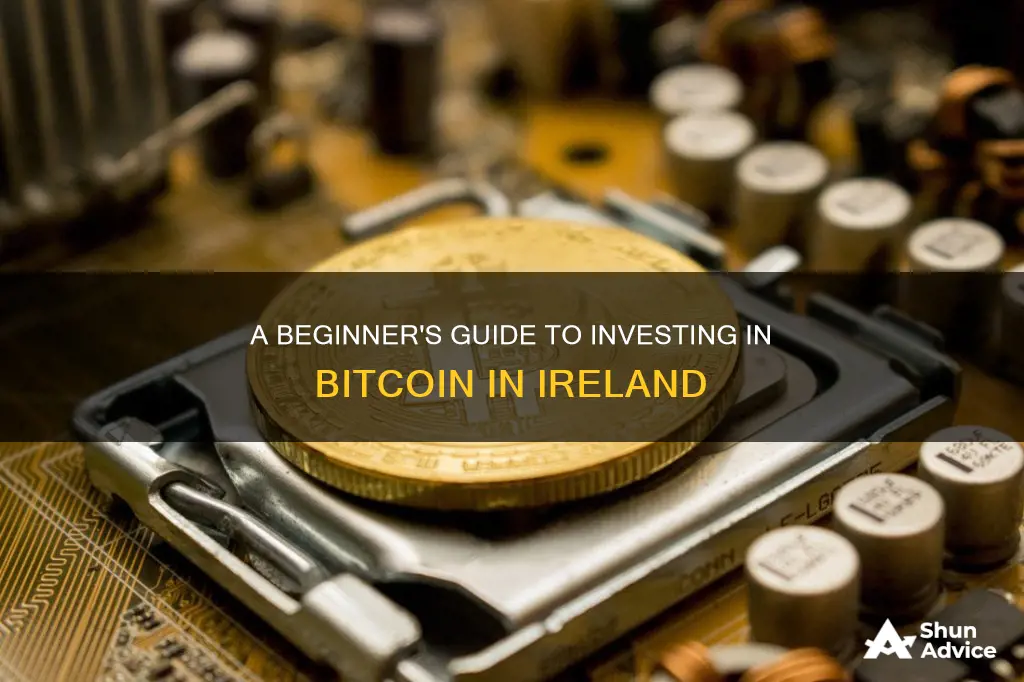
Bitcoin is a virtual currency or cryptocurrency that has been around since 2009. It is a medium of exchange that, unlike normal money, does not require a third party such as a bank to maintain it. Cryptocurrencies can be transferred from one user to another without going through an intermediary such as a bank. In Ireland, there are several ways to buy and sell Bitcoin, including through cryptocurrency exchanges, ATMs, and trading platforms.
| Characteristics | Values |
|---|---|
| Currency Type | Cryptocurrency |
| Currency Name | Bitcoin |
| Currency Symbol | BTC |
| Currency Status | Virtual Currency; Does not exist in paper or coin form |
| Bitcoin Supply | Fixed supply of 21 million |
| Bitcoin Price | $62,920 as of 24 April 2024 |
| Bitcoin Price History | Value rocketed in 2020-2021; Wild fluctuations; $8000 at the start of 2020; $65,000 in November 2021; $16,389 in November 2022 |
| Bitcoin Price Prediction | $146,000 in the long term (suggested by JP Morgan investment strategists) |
| Bitcoin Investments | Highly volatile; Unregulated in some EU countries; No consumer protection; Tax on profits may apply |
| Bitcoin Exchanges | eToro, Bitpanda, Coinbase, Bity, Bitstamp, LocalBitcoins, Bitfinex, CEX.IO, Bitcove, Coinmama |
| Bitcoin ATMs | 22 across the Republic of Ireland, mostly in Dublin |
| Bitcoin Wallets | Coinbase Wallet, Blockchain |
| Bitcoin Brokers | Bit2Me |
What You'll Learn

Best sites for Bitcoin trading in Ireland
Bitcoin is a virtual currency that has been around since 2009 and has seen its value soar in recent years. If you're looking to invest in Bitcoin, here are some of the best sites for Bitcoin trading in Ireland:
Coinbase
Coinbase is a well-known and trusted digital currency exchange with over 43 million users worldwide. It offers an all-in-one exchange and wallet system, making it a great starting point for beginners. Coinbase boasts high liquidity and buying limits, as well as a fast verification process. The company is regulated and holds licenses in all districts in which it operates. It is also VC-backed with over $100 million in funding. However, it has been noted to have higher fees and a confusing fee structure.
Binance
Binance is another popular option for Bitcoin trading, with a wide range of cryptocurrencies available and low trading fees. Within eight months of its launch in 2017, Binance became the world's largest cryptocurrency exchange by trading volume, processing over $1 billion daily. The platform offers four forms of payment and provides two-factor authentication for added security.
Kraken
Kraken is one of the safest bitcoin exchanges and is trusted by millions of users worldwide. It provides cryptocurrency-to-fiat trading and price information to Bloomberg Terminal. The company is well-capitalized and offers various payment methods, including EUR SEPA deposits and USD bank wire deposits. Kraken also provides cryptography-verified proof of reserve audits to ensure the security of user funds.
EToro
EToro is a well-established online trading platform that allows users to trade Bitcoin and over 30 other cryptocurrencies. It offers unique features like copy trading and supports various payment methods, including bank transfers, SEPA, NETELLER, and PayPal. eToro also has a clean and easy-to-use interface, making it accessible to beginners. However, it is important to note that eToro only allows trades in US dollars, which may be a disadvantage for some users.
Bitpanda
Bitpanda is an Austrian cryptocurrency exchange that offers a user-friendly platform and a personal wallet for its users. It has gained popularity in Europe due to its low fees and wide range of payment methods. Bitpanda prioritises security with features such as SSL encryption, DDOS protection, and email confirmation for critical actions.
When choosing a site for Bitcoin trading, it is important to consider factors such as fees, security, payment methods, and regulatory compliance. It is also recommended to use a hardware wallet for added security and to prevent hackers from stealing your funds.
IRA Bitcoin Investment: A Secure Retirement Plan
You may want to see also

How to avoid scams
- Be cautious of phishing scams: Double and triple-check website URLs. Scammers attempting a phishing scam will copy the URL of legitimate sites and swap letters and numbers—for example, using the number "1" instead of the letter "l".
- Avoid upfront fees: Reject any offer that requires an upfront fee, especially if that fee has to be paid in cryptocurrency.
- Don't trust anyone who contacts you: Don't trust anyone—including government officials, public figures, or strangers—who contacts you directly asking for payments in cryptocurrency or offering you an "investment opportunity."
- Don't take information at face value: Investigate the claims around any investment, especially if they seem too good to be true or promise overnight windfalls.
- Secure your private key: Never share your private key or the seed phrase to your cryptocurrency wallet with anyone, and store that information somewhere offline, also known as a cold wallet.
- Enable multi-factor authentication: Enable multi-factor authentication on your crypto wallet and exchange. However, be aware that this is not a foolproof solution, as seen in the Coinbase hack.
- Beware of fake celebrity endorsements: Crypto scammers sometimes pose as or claim endorsements from celebrities, businesspeople, or influencers to capture the attention of potential targets.
- Look out for pump and dump schemes: This involves fraudsters hyping a particular coin or token through an email blast or social media, causing a rush of traders to buy the coins and drive up the price. The scammers then sell their holdings, causing a crash as the asset's value sharply declines.
- Be cautious of fake apps: Be cautious of fake cryptocurrency apps available for download through Google Play and the Apple App Store.
- Be wary of cloud mining: Cloud mining refers to companies that allow you to rent mining hardware in exchange for a fixed fee and a share of the revenue. However, many cloud mining companies are scams or ineffective, resulting in losses or lower earnings than expected.
- Research initial coin offerings (ICOs): Several ICOs have turned out to be fraudulent, with criminals going to great lengths to deceive investors.
- Be cautious of promises of guaranteed returns: No financial investment can guarantee future returns, as investments can go down as well as up. Be wary of any crypto offering that promises definite monetary gains.
- Look out for excessive marketing: Crypto fraudsters often attract people by investing heavily in marketing, such as online advertising, paid influencers, and offline promotion, to reach a broad audience quickly and raise money fast.
- Be cautious of unnamed team members: If you can't find information about the key people running a cryptocurrency, it's best to be cautious.
- Be wary of free money: Any investment opportunity promising free money, whether in cash or cryptocurrency, is likely to be fake.
- Protect your wallet: Keep your wallet keys private and do not share them with any firm offering investment opportunities.
- Start small: When trying out a new crypto wallet app, start by transferring a small amount of money to confirm its legitimacy.
- Only invest in things you understand: If you don't fully understand how a particular cryptocurrency works, take the time to research it before deciding to invest.
- Take your time: Be cautious of high-pressure tactics urging you to invest money quickly, such as promises of bonuses or discounts for immediate participation. Conduct your own research before investing.
- Be wary of social media adverts: Crypto scammers often use social media to promote their schemes, leveraging unauthorized images of celebrities or high-profile businesspeople to create a sense of legitimacy. They may also promise giveaways or free cash.
- Ignore cold calls: If someone contacts you out of the blue to sell you a crypto investment opportunity, it's likely a scam. Never disclose personal information or transfer money to these individuals.
- Only download apps from official platforms: While fake apps can sometimes find their way into the Google Play Store or Apple App Store, it's generally safer to download apps from these official platforms than from other sources.
- Do your research: Research lesser-known cryptocurrencies thoroughly before investing. Look for a whitepaper that explains how the cryptocurrency is designed and how it will work, find out who runs it and how it operates, and seek out genuine reviews and testimonials.
- Be cautious of promises that seem too good to be true: Companies that promise guaranteed returns or overnight riches are likely to be scams. If something seems too good to be true, proceed with caution.
The Ultimate Guide to Investing Bitcoin in Philippines
You may want to see also

Bitcoin wallets explained
A Bitcoin wallet is a device or program that stores your cryptocurrency keys and allows you to access and manage your coins. It is called a wallet because it is used similarly to a wallet you put cash and cards in. Instead of holding physical currency, it stores the passkeys you use to sign for your cryptocurrency transactions and provides the interface that lets you access your crypto.
There are several different types of wallets, each with its own features and levels of security. The two main types of wallets are custodial and non-custodial. Custodial wallets (also called online wallets) are hosted by a third party that stores your keys for you. Non-custodial wallets are wallets in which you take responsibility for securing your keys. This is the type that most cryptocurrency wallets on devices are.
There are two subcategories of wallets: hot and cold. A hot wallet has a connection to the internet or to a device that has a connection, and a cold wallet has no connection. Lastly, there are three subcategories of wallets—software, hardware, and paper. Each of these types is considered either a hot or cold wallet.
So, you can have a non-custodial software hot wallet, a non-custodial hardware cold or hot wallet, or a custodial hardware cold wallet. These are the most common types, but you may also encounter other combinations.
Software wallets include applications for desktops and mobile devices. These wallets are installed on a desktop or laptop computer and can access your cryptocurrency, make transactions, display your balance, and much more. Some software wallets also include additional functionality, such as exchange integration if you're using a wallet designed by a cryptocurrency exchange.
Many mobile wallets can facilitate quick payments in physical stores through near-field communication (NFC) or by scanning a QR code. Mobile wallets tend to be compatible with iOS or Android devices. Trezor, Electrum, and Mycelium are examples of wallets that you can use. Software wallets are generally hot wallets.
Hardware wallets are the most popular type of wallet because you can store your private keys and remove them from your device. These devices might resemble a USB drive, and modern hardware wallets have several features. You can make a cryptocurrency transaction on your computer or device by plugging in the hardware wallet. Most of them can sign cryptocurrency transactions automatically without requiring you to enter the key, circumventing a hacker's ability to log your keypresses or record your screen. These devices often cost between $100 to $200. Ledger and Trezor are both well-known hardware wallets. Hardware wallets are generally considered cold wallets because they don't have an active connection until they are plugged in.
Some new hardware wallets come with the ability to connect to your device through Bluetooth. Use these with caution because Bluetooth is a wireless signal that can be accessed by unwanted parties when it is turned on.
Paper wallets are easily damaged or lost, so many crypto owners do not use them anymore. However, there is nothing wrong with using a paper wallet if you take measures to store it properly in a safe or deposit box and check on it once in a while to ensure it hasn't deteriorated.
When creating a Bitcoin wallet, a seed is created. Seeds are displayed in the form of a series of words, known as a mnemonic phrase. This seed is used to derive every individual Bitcoin key that you’ll use to send and receive bitcoin. You should never share this seed with unknown parties.
As long as a user knows their recovery seed, typically a 12- or 24-word list that was initialized with their wallet, they will always be able to restore their wallet. This recovery phrase allows the ultimate recovery of all funds within a wallet, so they must be protected against loss and theft.
Dogecoin Investing: A Beginner's Guide to Getting Started
You may want to see also

How to buy your first Bitcoin
Bitcoin is a virtual or "crypto" currency that has been around since 2009. It is a medium of exchange that, unlike the euro or dollar, does not exist in paper or coin form and does not need a third party such as a bank to maintain it. Transactions are stored using a special, incorruptible ledger known as blockchain.
If you are looking to buy your first Bitcoin, there are several ways to do so in Ireland. However, it is important to remember that crypto assets are highly volatile and unregulated, so you should not invest more than you are prepared to lose.
Choose a Cryptocurrency Exchange or Broker
The first step to buying Bitcoin is to choose a cryptocurrency exchange or broker. Some popular options include:
- EToro: A trading platform and crypto exchange that supports Bitcoin, Ethereum, Litecoin, and many other coins. It offers unique features like copy trading and has low fees.
- Coinbase: The world's largest Bitcoin broker, supporting customers in over 30 countries. Coinbase offers an easy and fast way for newcomers to purchase bitcoins and has a mobile app for convenience.
- Bitpanda: A European-based Bitcoin broker with high payment limits and low fees across a wide range of payment methods.
- CEX.IO: A reliable Bitcoin exchange service with over 3 million users worldwide. It offers two-factor authentication, anti-hacker protection, and a low trading fee of 0.25% for takers and 0.16% for makers.
- Bitstamp: One of the world's largest and most well-known Bitcoin exchanges with a very low fee of 0.25%, falling to 0.1% with sufficient trading volume.
Create an Account and Verify Your Identity
Once you have chosen an exchange or broker, you will need to create an account and verify your identity. This typically involves providing personal information such as your name, email address, and date of birth. Some platforms may also require you to provide a government-issued ID and proof of residence.
Deposit Funds into Your Account
After your account is created and verified, you will need to deposit funds into it. The methods for doing so will vary depending on the platform you have chosen, but may include bank transfer, credit/debit card, or other cryptocurrencies.
Place Your First Bitcoin Order
Once your funds have been deposited, you are ready to place your first Bitcoin order! Simply enter the amount of Bitcoin you want to buy, taking into account any minimum or maximum purchase amounts specified by the platform.
Store Your Bitcoin in a Secure Wallet
Finally, it is important to store your Bitcoin in a secure wallet. There are several types of Bitcoin wallets, including online, mobile, hardware, and paper wallets. Each has its own advantages and disadvantages in terms of security and accessibility, so be sure to do your research before choosing one.
A Beginner's Guide: Investing in Bitcoin in Bahrain
You may want to see also

Bitcoin price history
Bitcoin's price history reflects its evolution and growth over the years. Starting from a value of almost nothing, it has grown to be one of the most valuable assets in the world. The price history shows sharp rises followed by corrections, reflecting the volatile nature of the cryptocurrency market. It also shows periods of stability, indicating growing acceptance and use of Bitcoin.
In 2017, Bitcoin's value soared to approximately €17,000, and financial analysts predicted that its value would climb again in 2020. Bitcoin's price continued to rise, and in January 2021, investment strategists at JP Morgan suggested that Bitcoin could ultimately reach $146,000 in the long term. In March 2021, it was revealed that Elon Musk's electric carmaker Tesla had invested $1.5 billion in Bitcoin, further fuelling interest in the cryptocurrency.
Bitcoin's value increased significantly in 2024, influenced by decisions made by regulators and exchanges in the US and the UK. The launch of multiple Bitcoin exchange-traded funds (ETFs) in the US in January 2024 gave the cryptocurrency a new level of respectability. As a result, on March 11, 2024, the price of Bitcoin reached a new high of $72,000, surpassing the previous record of $65,000 set in November 2021. However, the price of Bitcoin can be volatile, and it fell to $16,389 in November 2022 after the collapse of the crypto exchange FTX.
Overall, Bitcoin's price history demonstrates its journey from a fringe asset to a mainstream financial instrument. The market cap has grown, leading to increased recognition and acceptance of Bitcoin as a legitimate asset class. This has attracted institutional investors, hedge funds, and even governments, boosting its credibility. However, the fluctuating market cap has also highlighted the volatility and risk associated with Bitcoin, sparking debates about its role in the financial system.
Gold Coin Investment: Which is the Best Buy?
You may want to see also
Frequently asked questions
Bitcoin is a virtual or "crypto" currency that has been in use since 2009. Unlike mainstream currencies, it does not exist in paper or coin form and has a fixed supply of 21 million.
You can buy Bitcoin through cryptocurrency exchanges such as eToro, Bitpanda, Coinbase, Bity, Bitstamp, and CEX.IO. Alternatively, you can use automated teller machines (ATMs) to purchase Bitcoin with cash.
Cryptoasset investing is highly volatile and unregulated in some countries, including certain EU countries. There is no consumer protection, and taxes on profits may apply. Additionally, there have been numerous scams and instances of people's "wallets" being stolen.
A Bitcoin wallet is a secure digital wallet used to store and keep track of your Bitcoin. While not all exchanges require you to have a wallet before purchasing Bitcoin, it is recommended for security reasons.
When selecting a Bitcoin exchange, consider factors such as transaction fees, withdrawal limits, payment modes, and the verification process. It is also essential to ensure the exchange is secure and compliant with relevant regulations.







